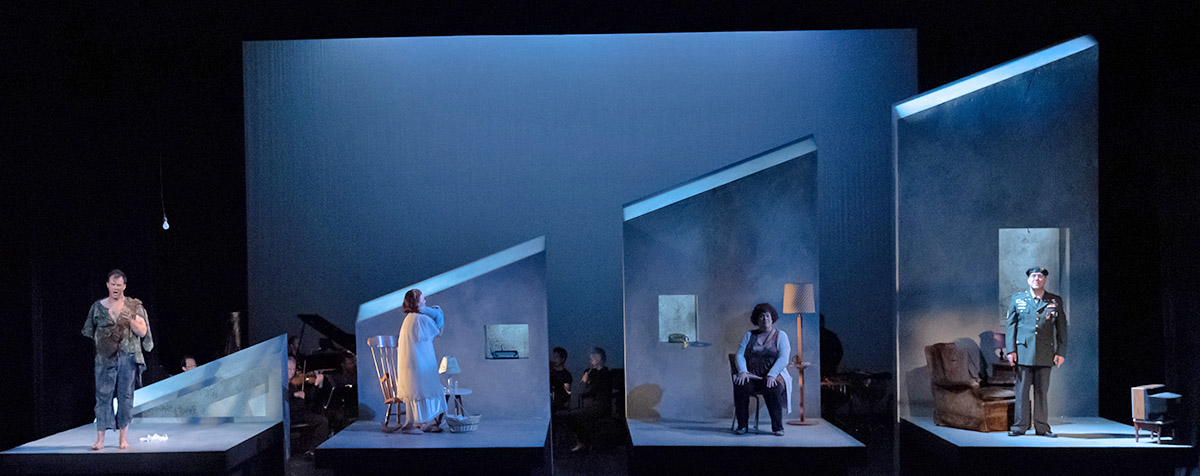
When the Vietnam War broke out, some of my former students left high school and proudly signed up to serve their country. Years later, one told me that when his ship returned, the dock was full of people with anti-war signs, shouting and reviling the marines. He could not fathom the hatred. Fearing for his safety, he hurried into the men’s room to change out of the uniform that had always made him feel like a hero. A confused, broken man, it wasn’t long before he was in drug rehab.
Tom Cipullo, who was born during that war which ripped the fabric of our society, wrote based his chamber opera Glory Denied on a book by Tom Philpott. It debuted at Brooklyn College in New York City in 2007 and then appearing in other parts of the country. In July it had two performances at the peripatetic Berkshire Opera Festival, which this year turned up at Simon’s Rock of Bard College, in Great Barrington.
This plucky little troupe keeps trying, and over the years has performed in every West Berkshires venue. (Later in August they’re to present Falstaff elsewhere in the vicinity.) Glory Denied offered committed singers, inexpensively ingenious staging, and good voices—especially Daniel Belcher as the older version of the Vietnam Vet.
The plot centers on the personal story of the war’s longest-held American prisoner of war, and his discovery upon release—reminding me of my student—of how much he had lost and how much glory he was denied. Cameron Anderson’s set, in four sections of increasing size, was a brilliantly creative illuminator of the characters’ lives and how they related to their surroundings.
The arts center auditorium is a dark space, which did not detract from the darkness of the opera’s themes. On the left side of the stage was a prison cell, so small that the lithe tenor John Riesen as Colonel Jim Thompson was probably the only one who could fold himself into it. Thinking about nine years living therein is evocative and cringe-inducing.
To the right a section housed his wife, Alyce. Maria Valdes, a sweet ingenue, pregnant with their fourth child. An alcove in the rear held a typewriter, on which she typed letters to Jim when she wasn’t knitting small garments. She could step forward on the set, so passionate duets with the prisoner were possible.
And to the right of that was the section of the tough, blowzy middle-aged Alyce, Caroline Worra, who had given up her husband for dead, told her children so, and gone off with another man. (Something like the Tom Hanks movie “Castaway.”) Her alcove held a telephone: “He went through hell but so did I,” she told someone.

Far right we saw the (largest) room, with the post-war Jim, replete with easy chair, flask handy on a table, and in the alcove, a bemedaled uniform which he donned at the end. From here, the clear-voiced baritone Daniel Belcher, whose substantial credits include a Grammy award for Saariaho’s L’Amour de Loin, dominated the vocally. Other voices sounded distinctively, but the omission of supertitles titles felt almost criminal. Everyone really tried to get the words across but only Belcher had the power to succeed. Too bad. Hope the next production, wherever it pops up, has titles.
The music, if not magnetic, was intense and anguished, its beautiful ensembles holding hints of neo-Barber. Conductor Geoffrey Larson faced the stage; the chamber orchestra, hidden behind the set, could watch him on monitors. The engaged sounds from the orchestra supported a well-balanced cast with no weak link. We witnessed true ensemble work all around.
Sadly, this is no period piece. Its issues remain; 50 years later, we’re fighting new variants. Maybe not so new. Look around: we’re not even done with Glory Denied.
See a 2019 BMInt review HERE
[short-bio]


